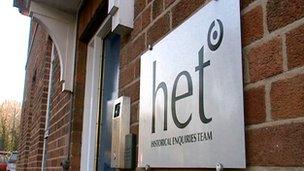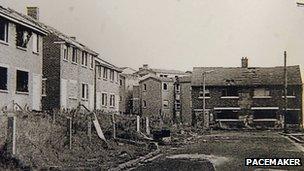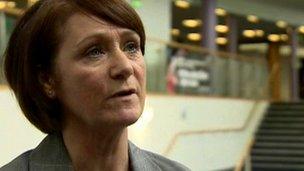HET enquiries must be even-handed: Victims commissioner
- Published

The HET is reviewing more than 150 killings of soldiers
The Historical Enquiries Team must adopt an even-handed approach when dealing with cases, a victims commissioner has said.
A report from the University of Ulster claimed soldiers were given favourable treatment and said the HET did not investigate the cases properly.
The report was backed by Victims Commissioner Patricia McBride who criticised the "different approaches".
"That is morally wrong and I suspect it might be outside the law," she said.
The University of Ulster report by Patricia Lundy said soldiers were given favourable treatment compared to former paramilitaries.
Ms McBride said: "What concerns me in this report that Patricia Lundy has published now is that different approaches appear to be taken by the HET depending on who is the victim and who is the perpetrator."
However, Ulster Unionist MLA and Policing Board member Ross Hussey said the review was limited.
"Unfortunately, in the Northern Ireland scenario, I don't think we will ever get the full story of all the cases, but where we can, let's recover the truth."
Among the deaths being looked into by the HET are those of 11 civilians shot dead over a three-day period in Ballymurphy.
All the killings were originally investigated by the Royal Military Police, but nine years ago a court ruled that those investigations had been inadequate.
The HET set up an independent team of former police officers from outside Northern Ireland to re-examine what happened.
It is reviewing more than 150 killings by soldiers between 1970 and September 1973. It has rejected the criticism.
Dr Patricia Lundy is a senior lecturer with the University of Ulster and spent more than two years reviewing how the cases are re-investigated.
She has produced a report which has questioned the independence of its work.
"I don't believe it is independent. The research indicates that the interviews with soldiers are not impartial, they are not effective and they are not transparent," she said.

The aftermath of the Ballymurphy attack in 1971
She claimed the HET gave soldiers "special treatment" by providing them with much more pre-interview material than in cases where republican or loyalist paramilitary killings were being investigated.
Dr Lundy also criticised the fact that soldiers were questioned as witnesses rather than as suspects.
"It is of considerable concern that there appears to be inequality in treatment where state agencies, in this case the military, are involved, compared to non-state or paramilitary suspects," her report states.
"There are examples in paramilitary-related history where suspects have received significantly less fulsome pre-interview disclosure. There is no clear rationale for this less favourable differentiation in treatment... the evidence suggests soldiers are given preferential treatment."
Dr Lundy has called for an independent assessment of the HET investigations by Criminal Justice inspector Dr Michael Maguire.
Belfast-based solicitor Padraig O Muirigh said he shared the concerns raised in the report.
He represents the families of those killed in Ballymurphy, and a number of others, including the mother of Frances Rowntree, an 11-year-old killed by a plastic bullet fired by a soldier in April 1972.

Dr Patricia Lundy criticised the fact that soldiers were questioned as witnesses
"It is a matter of grave concern if these killings have not been independently investigated because these are some of the most controversial killings of the conflict, " he said.
"The HET process appears to depend on the voluntary co-operation of soldiers who are then treated as witnesses rather than as suspects.
"The HET isn't sufficiently independent to deal with such cases. I think the best approach is to have a totally independent unit dealing with British army cases."
The HET has rejected the criticism.
It pointed out that there had been a number of cases where families of victims of army shootings welcomed apologies from the government and Ministry of Defence after the HET rejected the original military version of events.
They include the family of 23-year-old Aidan McAnespie, who was shot dead as he walked through an army checkpoint in Aughnacloy on his way to a GAA match in February 1988.
The soldier responsible claimed he had fired his gun accidentally, but that claim was dismissed in a report published by the Historical Enquiries Team.
The HET is directly accountable to the chief constable and Patricia Lundy's report will be discussed by the Policing Board on Thursday.
In a statement, the PSNI said the Historical Enquiries Team "has delivered a high degree of satisfaction to families during the past six years".
It said the chief constable recognised that concerns have been raised regarding some aspects of HET processes, and that he'll respond to those issues when the report is discussed by the Policing Board.
The statement said he will also consider commissioning an independent review of HET processes.
- Published2 July 2010